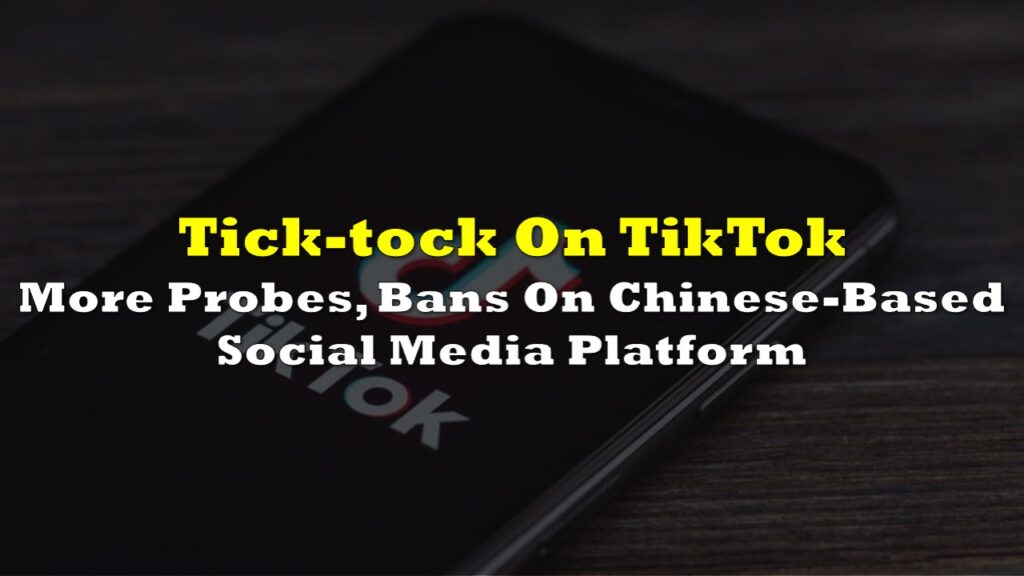TikTok’s executives are considering splitting off from ByteDance Ltd., their Chinese parent organization, as a way of addressing worries about potential safety threats.
If the existing plan submitted to the national security authorities is not accepted, the only solution left would be to divest, either through a sale or an initial public offering, people aware of the situation explain. However, the Chinese authorities would have to give the green light to such an arrangement.
TikTok, which is being investigated by the Committee on Foreign Investment in the United States, committed last year to implement a number of security measures in response to US regulators’ concerns. This $1.5-billion lobbying idea, dubbed Project Texas, entails bringing in US IT behemoth Oracle Corp. to hold US user data and assess its software, as well as establishing a three-person government-approved oversight board.
CFIUS, a panel of numerous agencies involved in national security, has stopped in its process, leaving TikTok wondering whether its plans would be sufficient to continue operating in the US. According to several sources familiar with the situation, members of the Justice Department’s committee have been unable to accept TikTok’s suggestion.
TikTok is also facing a slew of prospective legislation in Congress, some of which calls for a split. Concerned that the app could be forced to share data with the Chinese government or used as a tool of influence by China, lawmakers have sponsored various legislation with bipartisan support that demand for the app to be banned or sold.
“Neither a ban of TikTok nor a divestiture of TikTok from ByteDance does anything to address national security concerns about data transfers,” said Brooke Oberwetter, a spokesperson for TikTok. “Under Project Texas, TikTok data for our US users would be held to a significantly higher security standard than any comparable American company.”
TikTok CEO Shou Chew has been summoned to appear before a House committee next week to discuss the app’s data protection and security standards, as well as the company’s ties with the Chinese Communist Party.
“Not that big of a problem”
Amid the brouhaha in national security concerns with TikTok, users seems to hardly mind the potential issues brought by the app’s ties to the Chinese government. After several states started banning the app in universities, students still find a way to use the app in and out of the campuses.
“I was annoyed, because I live here and I get bored,” said St Mary’s College of Maryland student Liz Barr. “But now it works, so it’s not that big of a problem.”
She quickly worked out how to get around the restriction by using personal mobile data or a virtual private network (VPN). The block was implemented when Maryland officials banned the video app from government networks, citing national security concerns.
She went on to say that she is already handing up personal data to a slew of other apps and is skeptical that her data would be beneficial even if it was accessed.
“To me, I can understand banning it at government places because those are more sensitive,” she added. “But I’m not important enough as a college student with eight cents to my name.”
Meanwhile, students were surprised and irritated when the University of Oklahoma announced it was blocking the app on campus wi-fi in December, but “people were pretty quick to figure it out and navigate it,” says student body president Christopher Firch, noting that most people can simply switch from wi-fi to a personal mobile data plan to get around the ban.
“I don’t want to negate a national security issue… but I just think people are like, ‘this sucks’ and then laugh about it,” he said. “They’re not taking it super, super seriously.”
Iniko Thornell, 25, who works in New York City and has been using TikTok for about two years, stated that “it’s hard to care about one [social media company] and not care about all of them,” adding that they don’t believe any of their personal information on TikTok is that essential.
Support for a TikTok ban is growing among the general people in the United States. According to decision intelligence firm Morning Consult, 53% of adults in the United States supported a countrywide ban on Chinese-owned social media applications in December.
In contrast, only 29% stated they favored restricting TikTok in 2020, when US President Donald Trump initiated measures to ban TikTok and WeChat, moves that were eventually blocked in court.
According to Jordan Marlatt, a Morning Consult tech sector analyst, Americans aged 18-25 are less concerned about competition from China and more likely to distrust the US government. They also have a more positive attitude toward social media. The survey said less than one-third of respondents in this age bracket supported the prohibition of Chinese social media apps.
Information for this briefing was found via Bloomberg, BBC, and the sources mentioned. The author has no securities or affiliations related to this organization. Not a recommendation to buy or sell. Always do additional research and consult a professional before purchasing a security. The author holds no licenses.









